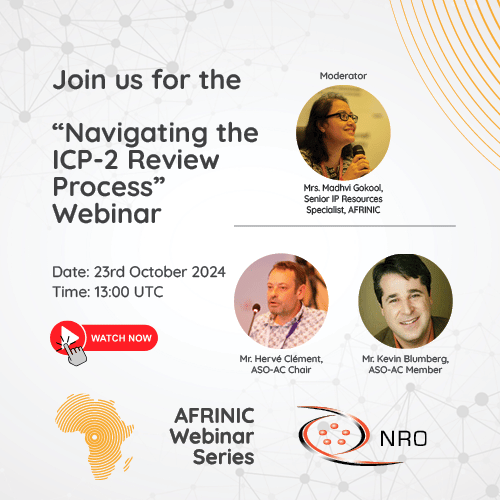NomCom call for volunteers
- Posted By AFRINIC
- Published On -
- Hits: 4976
22 January 2018 - The AFRINIC Board is required to appoint a Nomination Committee (NomCom) every year, in terms of article 9 of the Bylaws <https://afrinic.net/en/about/bylaws/2001-afrinic-bylaws-2016?start=8>.
I hereby call for volunteers from the community to fill three open positions on the 2018 NomCom. If you are interested in serving on the 2018 NomCom, please send your expression of interest, including a short biography, by email to legal (at) afrinic dot net by Friday 3 February 2018 at 20:00 UTC.
The duties of the NomCom, and the elections to be held, are described below.
Election To Be Held at the AGMM in May 2018:
- AFRINIC Board of Directors:
- Two Board seats are up for election, to serve three-year terms from 2018 to 2021. Terms begin and end after the AGMM where elections are held.
- - Seat 5 (Southern Africa), currently held by Lucky Masilela;
- - Seat 6 (Eastern Africa), currently held by Abibu Rashid Ntahigiye.
- Policy Development Working Group:
One PDWG co-chair position is up for election, to serve a two-year term from 2018 to 2020. Terms begin and end during the public policy meeting where the election is held. The seat is currently held by Sami Salih. - Governance Committee:
One Governance Committee position is up for election, to serve a three-year term from January 2019 to December 2021. Terms begin on 1 January and end on 31 December. The seat is currently held by Wafa Dahmani. - NRO-NC/ASO-AC:
No election in 2018. Terms begin on 1 January and end on 31 December. - Policy Development Appeal Committee:
This is a new committee. Three committee members (seats 3, 4, and 5) shall be selected within the AFRINIC community, in a manner similar to selection of the AFRINIC community representatives in the NRO NC.
Nomcom Composition and Responsibilities:
According to Section 9 of the AFRINIC by-laws, a Nominations Committee (NomCom) appointed by the Board must work to ensure that appropriate candidates are nominated to contest for open seats and that all elections are successfully conducted according to current procedures.
The AFRINIC Bylaws say that NomCom must have four members, appointed by the Board. The Board’s practice is to appoint the four members as follows;
- One member selected from within the AFRINIC Board;
- Three members selected by the AFRINIC Board from the community.
In terms of section 9.1 of the Bylaws:
- No candidate for election to the Board may be a member of the NomCom;
- No person domiciled in a region whose Board seat is open for renewal may be a member of the NomCom; this means that the 2018 NomCom may not not include people who reside in the Eastern Africa or Southern Africa regions.
Responsibilities of the NomCom are defined in section 9 of the AFRINIC Bylaws and include the following:
- Report to the Board and follow guidelines set by the Board;
- Call for candidates for all open positions;
- Prescribe criteria and qualifications for eligibility to stand for election;
- Interview candidates, if appropriate, prior to finalising the slate of candidates;
- Finalise the list of candodates for every election;
- Supervise the conduct of the polls by the Election Committee on election day.
The Board further expects NomCom members to:
- be neutral; to have no interest in the results of the elections;
- be trusted members of the AFRINIC community;
- have good knowledge of the AFRINIC business environment;
- do their best to fulfill their responsibilities.
NomCom members do not receive any remuneration.
AFRINIC staff will provide logistical support to the NomCom throughout their mandate. Such support includes publication of the list of nominees, compilation of comments, mailing list moderation, website update, communication with nominees and other duties pertaining to the roles and responsibilities of the NomCom. Travel support will be provided for the NomCom Chair to attend the AGMM where the elections are held.
How to Volunteer:
If you are interested in serving on the 2018 NomCom, please send your expression of interest, including a short biography, by email to legal<at>afrinic dot net by Friday 3 February 2018 at 20:00 UTC.

